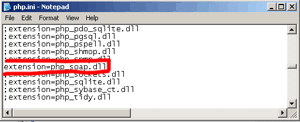Calling the WoRMS webservice from PHP5
This tutorial assumes you are using any webserver with PHP5 installed and working properly.
Step 1: Enable the soap extension in your php.ini
If you downloaded pre-compiled platform binaries, they may have ext/soap compiled in but not loaded, so you'll
need to update your PHP configuration to load ext/soap. Edit your php.ini, and look for the Dynamic Extensions
section. Add a line (or removed the ';' in front), this will cause the extension to be loaded automatically.
 |
|
If you haven't previously loaded any optional extensions, you may also have to set the extension_dir directive
to point to the directory containing the extension libraries, including php_soap, for example:
extension_dir="C:/php/ext/" (use forward slashes even on Windows)
Don't try to put directory information in the extension directive; use extension_dir if necessary.
Step 2: Paste the following code in a .php file (this is just an example)
$client = new SoapClient("https://www.marinespecies.org/aphia.php?p=soap&wsdl=1");
$aphiaid = $client->getAphiaID("Solea solea");
$taxon = $client->getAphiaRecordByID($aphiaid);
$class = $client->getAphiaClassificationByID($aphiaid);
echo "<b>AphiaID</b>: ".$taxon->AphiaID."<br/>\n";
echo "<b>Displayname</b>: ".$taxon->scientificname." ".$taxon->authority."<br/>\n";
echo "<b>URL</b>: ".$taxon->url."<br/>\n";
echo "<b>Accepted name</b>: ".$taxon->valid_name." ".$taxon->valid_authority."<br/>\n";
echo "<b>Classification</b>: ";
show_classification($class);
function show_classification($class) {
echo $class->scientificname." (".$class->rank.") > ";
if ($class->child) show_classification($class->child);
}
Step 3: Run the script
It should return something like this:
AphiaID: 127160
Displayname: Solea solea (Linnaeus, 1758)
URL: https://www.marinespecies.org/aphia.php?p=taxdetails&id=127160
Accepted name: Solea solea (Linnaeus, 1758)
Classification: Animalia (Kingdom) > Chordata (Phylum) > Vertebrata (Subphylum) > Gnathostomata(Superclass) > Pisces (Superclass) > Actinopterygii (Class) > Pleuronectiformes (Order) > Soleidae (Family) >Solea (Genus) > Solea solea (Species)Download this example.